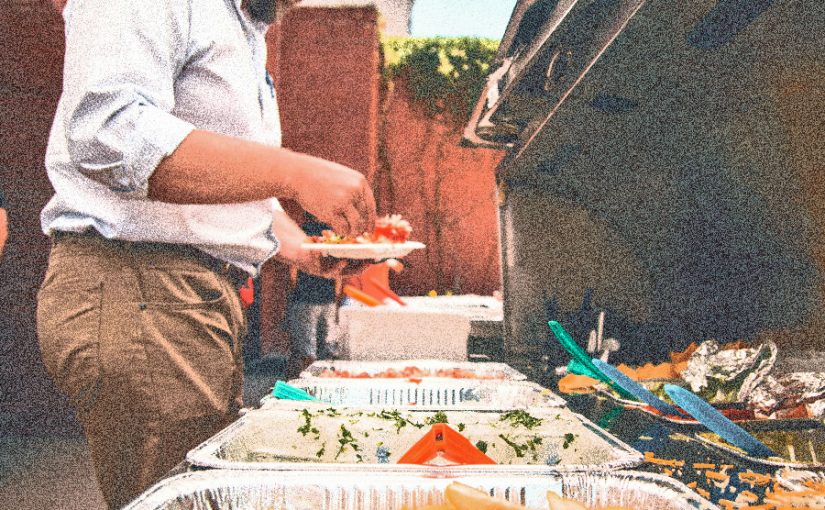A homily for the Eighteenth Sunday in Ordinary Time, August 4, 2024
Ex 16:2-4, 12-15, Eph 4:17, 20-24, Jn 6:24-35
All-you-can-eat buffets are among the most popular topics for cartoonists, animators and stand-up comedians. There probably are a thousand jokes for every item on the line at Golden Corral or China Palace (though I don’t think Red Lobster’s bankruptcy lawyers were laughing at the TikTokers who videoed themselves tossing back 100-plus “unlimited” shrimp).
Usually, the punch line is a variation on a Copious Consumer being shown the door while complaining, “But it says ‘All You Can Eat’!” and the proprietor replying, “That’s right. And I say you’ve eaten all you can eat.”
Or maybe a restaurateur someplace locks the doors, rolls down the shutters, turns out the lights and skedaddles when Homer Simpson appears on the horizon.
Even when an eatery promises some sort of endless bounty, there are economic — and practical and biological — limits. We won’t even think about the nauseating glutton Mr. Creosote in “Monty Python’s The Meaning of Life.” Oh, heavens, no.
So it’s understandable that some of us might assume there’s a cap or restriction or some other closing-time limitation on how much of the Bread of Life Jesus is offering us. Because we humans base our assumptions on our human experiences.
There’s not.
There’s absolutely no limit on how much sustenance Jesus provides. Spiritual sustenance only he can provide.
Not now.
Not ever.
Never. Never. Never.
Jesus clearly said “Never,” as recorded in John’s Gospel, and then Jesus explained in uncomplicated terms the significance of the true Bread of Heaven.
Love. Salvation. Eternal life in Paradise with God.
Christ’s victuals metaphor 2,000 years ago still rings true today, in terms pretty much everyone can relate to.
Let’s start with the simplicity and familiarity of bread, regarded throughout the history of humankind as the staff of life. When there’s nothing else to gnaw on, a crust of bread is the No. 1 choice. A little flour, a little oil, a little water, and you have the essential ingredients. Maybe skip the oil. Maybe add yeast and sugar of some sort. Raisins and cinnamon are delightful, though a luxury. If you don’t have an oven, a hot rock in the desert or a sunny spot on a beach will bake it for you. Just watch out for scorpions or gulls.
Hardtack, matzo, semolina loaf, baguette, WindMill hot dog roll, even Wonder or Silvercup. Manna for the wandering Israelites in the Desert of Sin. All are gifts from God when we pray, “Give us this day our daily bread.”
Bread — collectively, the variety of foodstuffs available to us — keeps our bodies alive.
But unlike the Israelites’ manna that — poof! — appeared in the wilderness, our bread for eating is the product of a different but related bread God has given us. Our physical sustenance — for those of us blessed enough to receive it regularly — comes from the skills and talents and imagination and wisdom and courage God has woven into each of us from the womb.
We may not be bakers (though we might be), but we probably have something to offer those who are. Or offer to farmers or butchers or anyone who can provide us with the goods and services that make everyday life on Earth possible.
The world’s economy is based on this.
Don’t forget: “Bread” is also slang for money, for riches.
And, for those of us blessed to live in comfort, the odds are good that we have enough to share with our sisters and brothers who don’t live as well as we do.
The world’s justice is based on this.
Our skills and talents make bread appear like manna on our tables. Our skills and talents can make bread appear like manna wherever it’s needed.
Because the Bread of Life that Jesus promised — promises — is God’s sustaining love. And if we embrace it, this love will fill us and spill over. Way over.
The infinite love of God sent Jesus to redeem us from the sin of Adam and Eve and lead us out of human imperfection and selfishness into the light of charity.
This is the love that God commands us to share.
This sharing-the-love thing isn’t always easy, which is why God built a hunger for the Bread of Life into all of us. We crave spiritual sustenance, we crave community, we crave a recharging of our connection to the divine.
And God gives us this day our daily bread. The Bread of Life.
Jesus gave us the Sacrament of the Eucharist, so we who rely on our five senses would remember that our souls are linked to our Triune God.
God likewise sustains us with the Good News, which these days is available 24/7 at the touch of a screen.
And thus sustained in body, mind, heart and soul, we go forth. Because we know what we are called to do.
